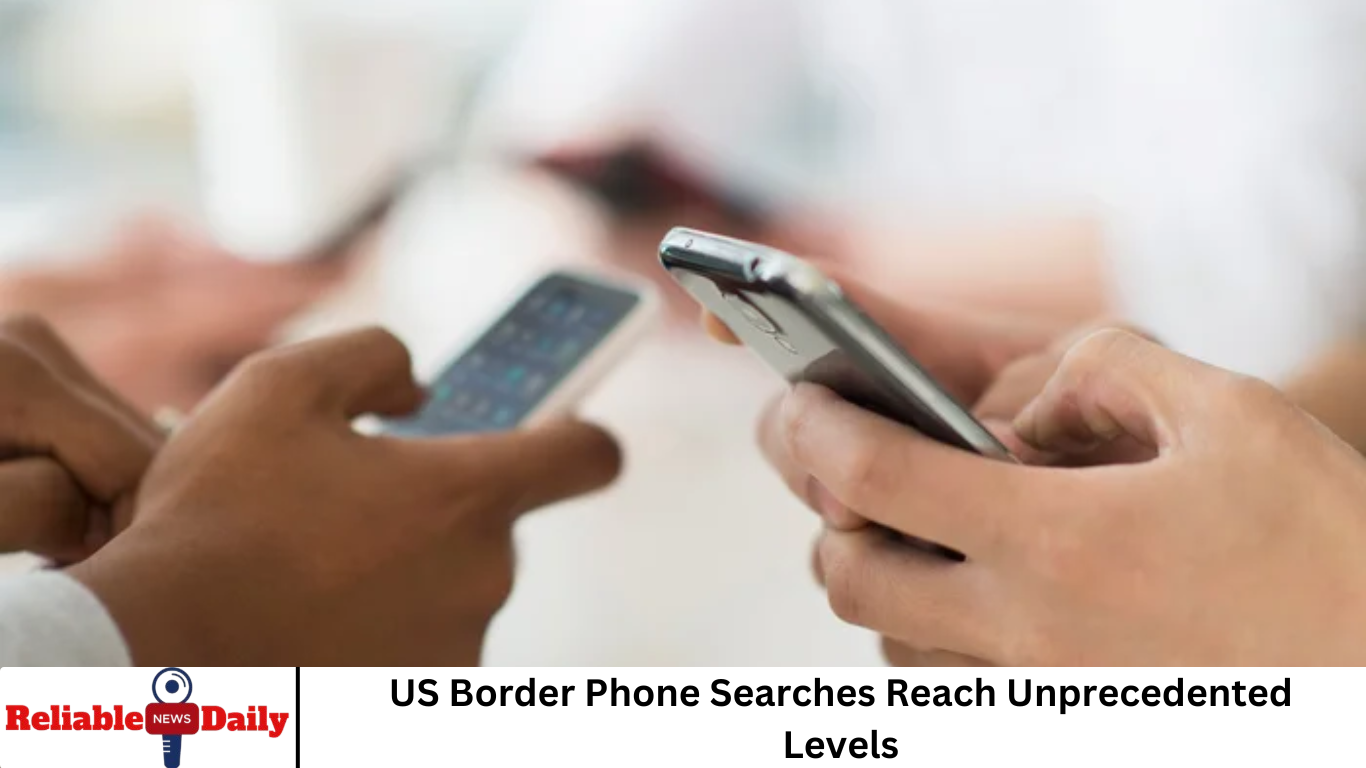United States Customs and Border Protection (CBP) officials have increasingly exercised their authority to search electronic devices at the border, including smartphones, laptops, and tablets.
According to recently released data, the past few months have seen record-high device searches, sparking concerns among privacy advocates, civil liberties organizations, and travelers. This unprecedented surge highlights the growing tension between national security priorities and individual privacy rights.
More Read: Angela Rayner Faces Legal Challenge Over Green Belt Datacentre Proposal
The Scope of CBP Authority
Under U.S. law, CBP officers have broad powers to inspect travelers’ belongings at ports of entry. This authority extends beyond luggage and physical goods to include electronic devices. Travelers entering the United States, including U.S. citizens, can be subjected to device searches without a warrant. While these searches are legally justified under border search exceptions, critics argue they challenge fundamental privacy rights protected under the Fourth Amendment.
CBP’s authority allows officers to examine the contents of phones, computers, tablets, and even cloud accounts accessible from these devices. Officers may copy data, review messages, photos, videos, and app information, and sometimes even require travelers to unlock encrypted devices. This authority has been part of CBP protocols for years, but recent trends indicate a marked increase in the frequency and scope of these searches.
Record-High Searches
Newly released figures show that CBP conducted more phone and electronic device searches over the past three months than at any time in history. While precise numbers vary depending on reporting periods, the overall trend points to a significant escalation.
The surge in searches raises questions about the underlying causes. Experts suggest several contributing factors:
- Heightened Security Concerns: In an era of global terrorism, smuggling, and cybercrime, border authorities argue that device searches are essential to national security.
- Technological Advancements: Smartphones and devices now contain vast amounts of personal and business information, making them a rich source of intelligence.
- Policy Shifts: CBP has increasingly emphasized technology-based inspections, reflecting a broader trend toward digital surveillance.
Legal and Ethical Implications
While border searches of luggage are widely accepted, electronic device searches present unique legal and ethical challenges. Devices can contain highly personal information, from private conversations and family photos to sensitive business and medical records. The invasive nature of such searches raises important questions:
- Privacy Rights: Critics argue that warrantless device searches constitute an overreach of governmental power. Unlike traditional luggage, electronic devices contain detailed personal histories, communications, and financial information.
- Impact on U.S. Citizens: Although CBP is permitted to search U.S. citizens’ devices, such actions spark debates about constitutional protections and civil liberties.
- Data Security: Travelers worry about how copied or accessed data may be stored, shared, or used, especially in cases where the search does not result in any legal action.
Several advocacy groups, including the American Civil Liberties Union (ACLU), have called for stricter regulations governing device searches at the border. They argue for mandatory warrants or oversight to ensure searches are limited, justified, and transparent.
How Device Searches Are Conducted
CBP officers typically perform electronic device searches at ports of entry, including airports, land borders, and seaports. The process generally involves several steps:
- Selection: Travelers may be randomly selected or targeted based on risk profiles, travel history, or other factors.
- Inspection Request: Officers ask travelers to provide access to their devices, which may involve unlocking phones, tablets, or laptops.
- Data Examination: Officers may browse through emails, photos, text messages, social media accounts, and cloud services.
- Data Copying: In some cases, CBP may copy data for further review, raising concerns about long-term storage and privacy.
Some travelers report being detained for hours while officers examine devices, creating additional stress and potential disruption. While many searches result in no legal action, the experience can feel intrusive and intimidating.
Traveler Experiences and Concerns
Stories from travelers provide insight into the personal impact of CBP device searches. Many report feeling singled out or questioned about sensitive information unrelated to their travel. Common concerns include:
- Loss of Privacy: Travelers often feel their personal lives are under scrutiny.
- Fear of Data Misuse: Copying personal information to government databases can cause anxiety about potential misuse.
- Disruption of Travel: Device searches can lead to missed flights, delayed meetings, and added stress during travel.
Despite these concerns, most travelers comply with CBP requests, as refusal can result in denied entry or further legal complications.
Policy Responses and Recommendations
In response to growing scrutiny, experts and advocacy groups have suggested several policy reforms to balance security and privacy:
- Clear Guidelines: Implement transparent rules about what constitutes a justifiable device search.
- Minimization of Data Collection: Limit data copying to information relevant to security or customs concerns.
- Mandatory Oversight: Establish independent review mechanisms to monitor searches and ensure compliance with legal standards.
- Traveler Notification: Inform travelers when their devices are searched, including what data is accessed and why.
- Digital Security Education: Encourage travelers to use encryption and other security measures to protect sensitive information.
Some lawmakers have proposed legislation requiring warrants for certain types of device searches, particularly for U.S. citizens and permanent residents. While these proposals face legal and political challenges, they reflect growing concern over the balance between national security and civil liberties.
Technological and Legal Challenges
The rise of encryption and advanced security features on devices presents additional challenges for CBP. Strong encryption can prevent officers from accessing data, leading to potential standoffs at the border. In some cases, authorities may attempt to compel travelers to unlock devices or provide passwords, raising further legal and ethical debates.
Courts have struggled to establish clear precedents for digital searches at the border. While border search exceptions to the Fourth Amendment allow for warrantless inspections, there is ongoing debate about how these rules apply to the immense quantity of personal data stored on modern devices.
International Comparisons
The United States is not alone in conducting device searches at borders. Other countries, including Canada, the United Kingdom, and Australia, have similar policies allowing border officers to inspect electronic devices. However, the U.S. trend toward record-high searches stands out, particularly in terms of scale and frequency.
Privacy advocates argue that the U.S. approach may set concerning global standards for surveillance and border enforcement. Increased scrutiny and international dialogue may help establish norms that protect travelers while maintaining security.
The Future of Border Device Searches
As technology continues to evolve, the tension between security and privacy at U.S. borders is likely to intensify. Smartphones, laptops, and other devices increasingly function as repositories of our personal and professional lives. CBP’s expanded focus on device searches reflects the broader trend of digital surveillance in law enforcement and national security.
Travelers should be aware of their rights and prepare accordingly. Experts recommend minimizing sensitive data carried across borders, using encrypted devices, and staying informed about evolving CBP policies.
Meanwhile, ongoing public debate, legal challenges, and policy discussions will shape the future of border device searches. Striking a balance between security and individual privacy will remain a critical issue for policymakers, legal experts, and citizens alike.
Frequently Asked Question
Can CBP search my phone at the US border?
Yes. U.S. Customs and Border Protection (CBP) officers have broad authority to search electronic devices, including phones, laptops, and tablets, at ports of entry. This applies to both U.S. citizens and foreign travelers.
Do I need a warrant for a border device search?
No. Under current law, CBP can conduct device searches without a warrant at the border due to the border search exception to the Fourth Amendment. However, this has sparked debates about privacy rights and legal limitations.
What type of data can CBP access on my phone?
CBP may examine emails, photos, messages, apps, social media accounts, and even cloud-stored data. In some cases, they may copy information for further review.
What should I do to protect my privacy when traveling?
Travelers can minimize sensitive data on devices, use strong encryption, back up data, and consider using temporary devices or travel-only accounts. Being aware of your rights and prepared for potential inspections is also important.
Are device searches common at U.S. borders?
Yes. Recent data shows that CBP device searches have reached record levels over the past few months, indicating a significant increase compared to previous years.
Can I refuse a device search at the border?
You can refuse, but doing so may result in denied entry into the United States or additional questioning. Compliance is generally recommended to avoid complications.
Are there any legal challenges to these searches?
Yes. Privacy advocates and organizations like the ACLU have raised concerns about the constitutionality and ethical implications of border device searches. Lawmakers are also exploring policies to limit or regulate these inspections, especially for U.S. citizens.
Conclusion
The record-high increase in U.S. border phone searches underscores the growing power of digital surveillance in the name of national security. While CBP maintains that these searches are necessary to protect the country, critics warn of significant privacy risks and potential overreach. As device searches become more common, travelers, lawmakers, and civil liberties groups face important questions about the limits of government authority, the protection of personal data, and the evolving definition of privacy in the digital age.

